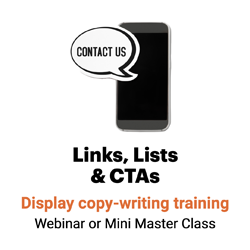What writers & others say

Writing workshops, communication consulting and writing services


“Readers” don’t read. Even highly educated web visitors read fewer than 20% of the words on a webpage.
So how do you reach “readers” who won’t read your paragraphs?
Learn how to put your messages where your readers’ eyes really are — in links, lists and CTAs — at our display copy-writing workshop.
____
Learn to get the word out with our proven-in-the-lab techniques in our email newsletter.